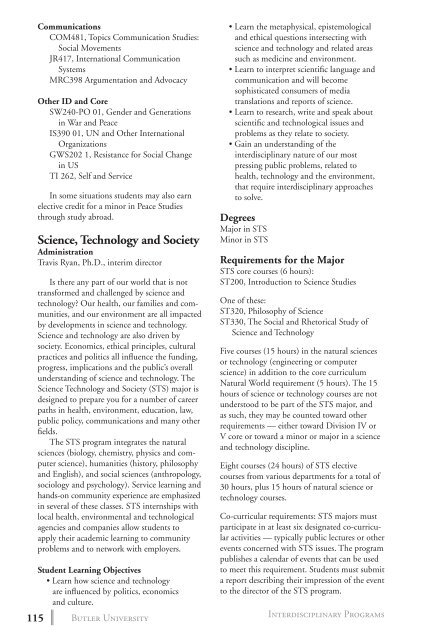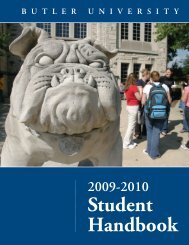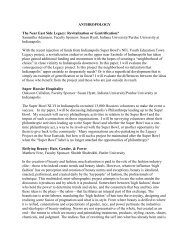2 0 1 3 bulletin - Butler University
2 0 1 3 bulletin - Butler University
2 0 1 3 bulletin - Butler University
Create successful ePaper yourself
Turn your PDF publications into a flip-book with our unique Google optimized e-Paper software.
115<br />
Communications<br />
COM481, Topics Communication Studies:<br />
Social Movements<br />
JR417, International Communication<br />
Systems<br />
MRC398 Argumentation and Advocacy<br />
Other ID and Core<br />
SW240-PO 01, Gender and Generations<br />
in War and Peace<br />
IS390 01, UN and Other International<br />
Organizations<br />
GWS202 1, Resistance for Social Change<br />
in US<br />
TI 262, Self and Service<br />
In some situations students may also earn<br />
elective credit for a minor in Peace Studies<br />
through study abroad.<br />
Science, Technology and Society<br />
Administration<br />
Travis Ryan, Ph.D., interim director<br />
Is there any part of our world that is not<br />
transformed and challenged by science and<br />
technology? Our health, our families and communities,<br />
and our environment are all impacted<br />
by developments in science and technology.<br />
Science and technology are also driven by<br />
society. Economics, ethical principles, cultural<br />
practices and politics all influence the funding,<br />
progress, implications and the public’s overall<br />
understanding of science and technology. The<br />
Science Technology and Society (STS) major is<br />
designed to prepare you for a number of career<br />
paths in health, environment, education, law,<br />
public policy, communications and many other<br />
fields.<br />
The STS program integrates the natural<br />
sciences (biology, chemistry, physics and computer<br />
science), humanities (history, philosophy<br />
and English), and social sciences (anthropology,<br />
sociology and psychology). Service learning and<br />
hands-on community experience are emphasized<br />
in several of these classes. STS internships with<br />
local health, environmental and technological<br />
agencies and companies allow students to<br />
apply their academic learning to community<br />
problems and to network with employers.<br />
Student Learning Objectives<br />
• Learn how science and technology<br />
are influenced by politics, economics<br />
and culture.<br />
<strong>Butler</strong> <strong>University</strong><br />
• Learn the metaphysical, epistemological<br />
and ethical questions intersecting with<br />
science and technology and related areas<br />
such as medicine and environment.<br />
• Learn to interpret scientific language and<br />
communication and will become<br />
sophisticated consumers of media<br />
translations and reports of science.<br />
• Learn to research, write and speak about<br />
scientific and technological issues and<br />
problems as they relate to society.<br />
• Gain an understanding of the<br />
interdisciplinary nature of our most<br />
pressing public problems, related to<br />
health, technology and the environment,<br />
that require interdisciplinary approaches<br />
to solve.<br />
Degrees<br />
Major in STS<br />
Minor in STS<br />
Requirements for the Major<br />
STS core courses (6 hours):<br />
ST200, Introduction to Science Studies<br />
One of these:<br />
ST320, Philosophy of Science<br />
ST330, The Social and Rhetorical Study of<br />
Science and Technology<br />
Five courses (15 hours) in the natural sciences<br />
or technology (engineering or computer<br />
science) in addition to the core curriculum<br />
Natural World requirement (5 hours). The 15<br />
hours of science or technology courses are not<br />
understood to be part of the STS major, and<br />
as such, they may be counted toward other<br />
requirements — either toward Division IV or<br />
V core or toward a minor or major in a science<br />
and technology discipline.<br />
Eight courses (24 hours) of STS elective<br />
courses from various departments for a total of<br />
30 hours, plus 15 hours of natural science or<br />
technology courses.<br />
Co-curricular requirements: STS majors must<br />
participate in at least six designated co-curricular<br />
activities — typically public lectures or other<br />
events concerned with STS issues. The program<br />
publishes a calendar of events that can be used<br />
to meet this requirement. Students must submit<br />
a report describing their impression of the event<br />
to the director of the STS program.<br />
Interdisciplinary Programs
















